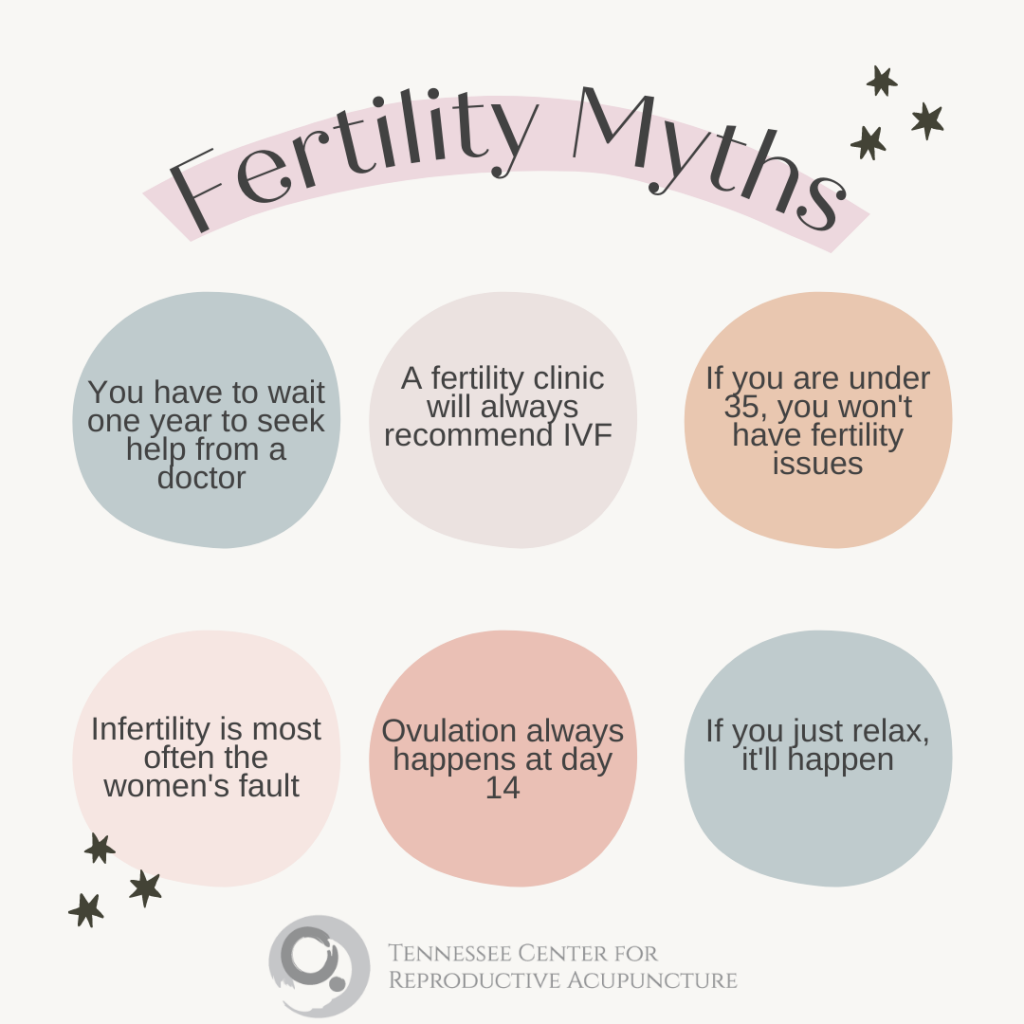
Friends, family, and the internet are full of well-meaning advice meant to help those trying for a child. However, much of this information is, at best, a well-meaning half truth. We took a few of the most common fertility myths we come across and tried to break them down.
You have to wait one year to see a fertility doctor:
This advice encouraging couples to wait one year assumes they are under 35 and that the female partner has regular cycles. If you have irregular cycles, are over 35, have a history of endometriosis, PCOS, etc please contact your doctor sooner than one year. We’ve seen so many couples wait the “recommended year” while they only have 2 periods in a year, etc. Early testing and interventions can reduce months of heartache and get you on the correct treatment path sooner. When in doubt, check with your doctor to see what they might or might not recommend. One caveat, there are some insurance companies that will not pay for fertility testing until the couple has been trying for a year, so do your due diligence to avoid an unexpected medical bill.
A fertility clinic will always recommend IVF
There is such a stigma around seeking help from a fertility clinic. This stigma, fortunately, is a huge myth! Going to a see a reproductive endocrinologist (aka fertility doctor) will ensure that you get the best testing at the right times to get to the root of your issue. Once you have arrived at your diagnosis, a treatment plan will be presented to you that might start with monitoring a cycle, medication (while trying on your own at home), surgery, IUI, and in some cases IVF. You’ll have the opportunity to discuss this plan with your partner, doctor and even get a second opinion to make sure you’re getting the best care possible. There are so many treatment options prior to IVF for most couples.
We believe knowledge can empower your treatment decisions and know that it can help us determine what acupuncture can and cannot do for you. In addition, once you are pregnant, fertility clinics will monitor your blood levels immediately and re-run those tests frequently to address any issues as early as possible and give you peace of mind during the often stressful first few weeks of pregnancy.
If you are under 35, you won’t have fertility issues
Yes, fertility declines with age and women see a biggest drop after 35. Men also see a less pronounced decline in fertility with age. If you have been having unprotected sex for over a year, have irregular cycles, or other concerning symptoms or relevant medical history, please seek out the care of your OB/GYN or make an appointment with a reproductive endocrinologist. On the flip side, being over 35 does not mean you don’t have a chance of getting pregnant. Many of our patients are over 35 and many go on to become pregnant.
Infertility is the women’s fault
First off, I hate the word fault. We’d never use that word to describe any other health condition, so let’s throw that out right now. Secondly, male factor infertility accounts for 1/3rd of all infertility cases. Female factor accounts for another 1/3 and a combination of male and female account for the other 1/3. In fact, one of the first tests your doctor will (or should) run is a semen analysis. A full diagnostic workup by a reproductive endocrinologist can help pinpoint your issues and guide appropriate treatment.
Ovulation always happens at cycle day 14
It is often assumed that ovulation always occurs at cd 14, but this couldn’t be further from the truth. Ovulation can vary from woman to woman and even from cycle to cycle. Medications, stress, illness, etc can change the timing of ovulation as well. We recommend tracking your cycles with one of the many apps on the market and using ovulation predictor kits to determine when your ovulation occurs. Timing intercourse at the wrong time can be a reason a couple isn’t becoming pregnant.
If you just relax….
Stress DOES NOT cause infertility. We always tell our patients that if stress caused infertility, no one going through fertility treatment would become pregnant. What is true is that infertility causes stress. It is also linked to higher rates of depression and anxiety. This journey can be long and tough. It is important to take care of yourself so you can be your best self throughout the ups and downs. Acupuncture can help to reduce stress, which we see as a way to support our patients on this journey. We also recommend seeking the support of a therapist who specializes in infertility to help you navigate this time in your life.
